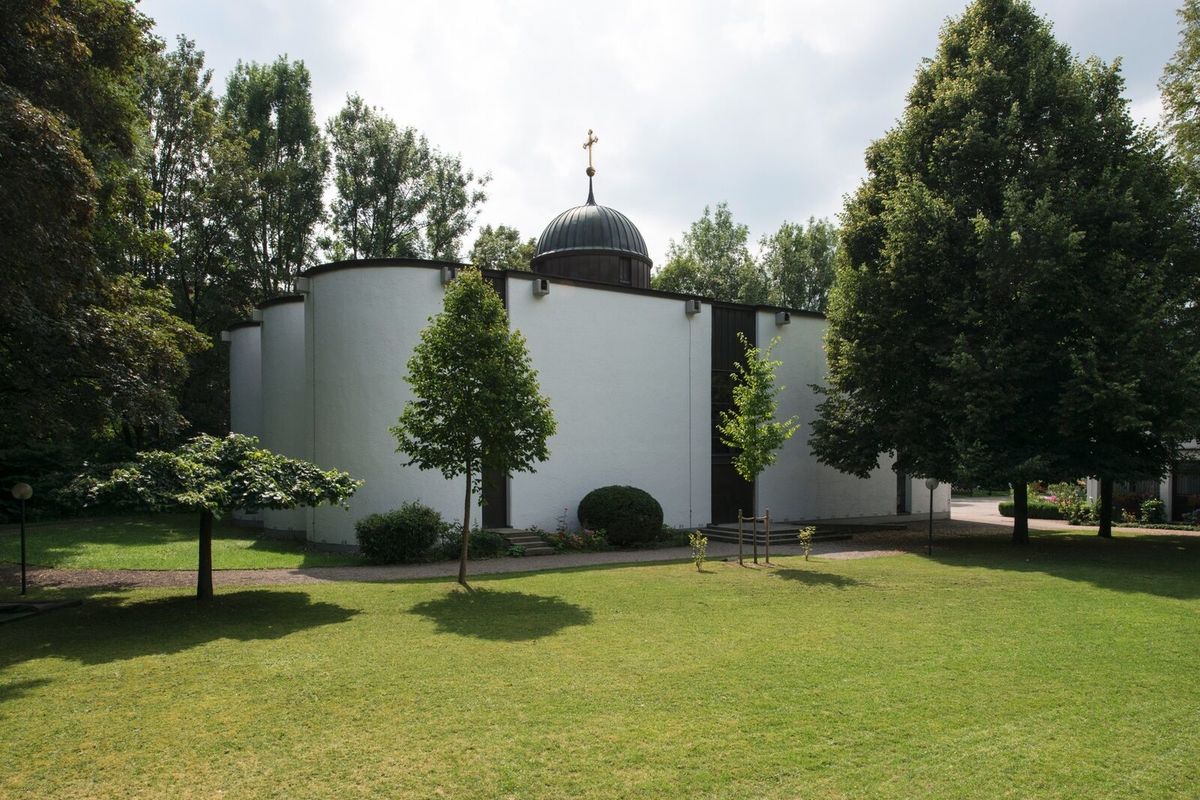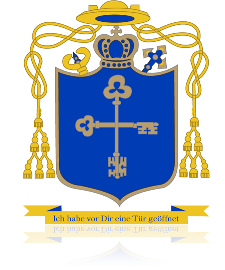Ukrainian Greek Catholic Apostolic Exarchate in Germany and Scandinavia

About
The Ukrainian Greek Catholic Apostolic Exarchate in Germany and Scandinavia takes care of the Ukrainian Greek Catholics in Germany, Finland, Norway, Denmark, and Sweden. Most of the faithful of the exarchate are descendants of Ukrainians who left Ukraine because of the discriminatory national policy of the Republic of Poland, or the Bolshevik system in the interwar and war years. Thus, the total area of the exarchate is about 1 574 232 km2 where 108 251 720 people live.
The jurisdiction of the Apostolic Exarchate extends to the entire territory of Germany. Since 1984, Scandinavia has been added to its guardianship. All Greek Catholic priests and faithful in this territory are subject to the jurisdiction of the Apostolic Exarch, who by decision of the Second Vatican Council is a full member of the German Bishops’ Conference.
Today there are 4 deaneries in Germany. To take care of the faithful and celebrate Divine Liturgy at least once a week, priests have to overcome long distances.
Parishes are located in the following cities:
a) Germany
- Augsburg;
- Bamberg;
- Berlin;
- Bielefeld;
- Bochum;
- Bodelshausen-Messingen;
- Braunschweig;
- Bremen;
- Darmstadt;
- Dortmund;
- Dresden;
- Düsseldorf;
- Eggenfelden;
- Erfurt;
- Essen;
- Frankfurt;
- Frankfurt-on-Oder;
- Freiburg im Breisgau;
- Fulda;
- Göttingen;
- Halle;
- Hamburg;
- Hannover;
- Heidelberg;
- Hildesheim;
- Ingolstadt;
- Kaiserslautern;
- Karlsruhe;
- Kassel;
- Koblenz;
- Cologne;
- Constance;
- Krefeld;
- Landsgut;
- Leipzig;
- Ludwigsburg;
- Mainz;
- Magdeburg;
- Mannheim;
- Munich;
- Munich-Ludwigsfeld;
- Muenster;
- Neu-Ulm;
- Neuwied;
- Nuremberg;
- Paderborn;
- Passau;
- Regensburg;
- Rosenheim;
- Saarbrücken;
- Siegen;
- Stuttgart;
- Trier;
- Tübingen;
- Würzburg.
b) Denmark
- Copenhagen;
- Vejle;
- Aalborg.
c) Sweden
- Vernam;
- Stockholm;
- Gothenburg;
- Örebro;
- Malmo;
- Kristianstad;
- Vekshe.
d) Finland
- Helsinki.
e) Norway
- Oslo.
Today the special task of the Apostolic Exarchate is to serve and care for those Ukrainians who live in Germany and the Scandinavian countries. The number of Ukrainians living here in settlements has increased due to a new wave of emigration of Ukrainians who are also seeking asylum and care in Ukrainian society in settlements in Germany. An important task of the Apostolic Exarchate is also to find those Ukrainians who until now did not belong to the Church due to their past in the atheistic society of Soviet socialism, or stopped going to church for various reasons. They need to be given a Christian orientation, a sense of belonging to their family, and thus the opportunity to feel like full-fledged Christians and Ukrainians.
Ukraine’s rapprochement with Western Europe is also one aspect of the work of the Apostolic Exarchate. After all, due to the enlargement of the European Community, Germany is gaining more influence on the society in Ukraine. The goal of the rapprochement of the two peoples includes not only religious but also cultural and social fields of cooperation.
 Coat of arms of the Ukrainian Greek Catholic Apostolic Exarchate in Germany and Scandinavia
Coat of arms of the Ukrainian Greek Catholic Apostolic Exarchate in Germany and Scandinavia
From the ecumenical point of view, the Ukrainian Greek Catholic Church looks for contact with other Churches of the Byzantine Rite. The brotherhood of the Eastern Churches and their peaceful coexistence is the contribution of every Christian to the unity that everyone aspires to.
The Ukrainian pastorate receives great help from the German Bishops’ Conference, which supports its work, its purpose, and the service of the Apostolic Exarchate. And Charitable Foundation of St. Ansgarwerk largely supports the Ukrainian pastorate of the Byzantine rite in the Scandinavian countries.
The clergy of the Apostolic Exarchate serves their faithful in more than 40 places, which are scattered throughout Germany. Constant bishop visits strengthen cooperation with pastors. Pilgrimages and meetings are organized with the participation of our senior members and youth. It deepens religious life in the native rite and builds community. Ukrainian nuns (Sisters Servants of Mary Immaculate), priests, and teachers teach our children the basics of catechism, the Ukrainian language, and culture at Saturday schools. In addition, there are various Ukrainian associations and organizations, especially charitable and scientific institutions, such as the Ukrainian Free University, the house of the society Ridna Shkola, and the community of Ukraine.
The Apostolic Exarchate publishes the church newspaper Christian Voice, which has been published since 1949 and is distributed twice a month throughout Europe.
According to 2016 statistics, there are 49,500 faithful in the Apostolic Exarchate. 27 eparchial priests and one deacon carry out their pastoral ministry for Ukrainian Catholics in Germany and Scandinavia. Besides this, there are eight monks in the exarchate.
Location
Bishop
The ruling Bishop of the Apostolic Exarchate in Germany and the Scandinavian countries is Bishop Bohdan Dzyurach.
The cathedral of the Apostolic Exarchate in Germany and Scandinavia is the Cathedral of the Intercession of the Mother of God and St Andrew the First-called in the city of Munich (Germany).
History
a) Ukrainian emigration to Germany
Organized pastoral care of Ukrainian Catholics of the Byzantine rite in Germany began in the early twentieth century. The number of Ukrainians at that time was probably about 50,000 people. These were refugees from Galicia who left their land due to the discriminatory national policy of the newly created Polish Republic. Students and temporal workers who temporarily were looking for asylums in Germany were also members of the Ukrainian community.
In 1927, the servant of God, Metropolitan Andrey Sheptytsky, established a pastoral deanery for Ukrainian Catholics in Berlin, where Fr. Dr. Petro Verhun was beatified in 2001. In 1940 the Apostolic See appointed Fr. Petro as Apostolic Visitor and Administrator for Ukrainian Catholics in Germany. On October 12, 1945, his successor was Fr. Mykola Voyakovsky as the deputy head of the Apostolic Visitation. Later, for the reorganization of the Ukrainian pastorate abroad, Pope Pius XII appointed Cyrus Ivan Buchko as Apostolic Visitator in Western Europe and at the same time the head of the pastorate for Ukrainian Catholics of the Byzantine Rite. Fr. prelate Petro Golynskyi became his deputy and Vicar General in Germany.
In the postwar period, the Bolsheviks, under the guise of “repatriation,” persuaded or forced Ukrainians to return to their land. Upon their return, almost all of them were arrested and charged with collaborating with German nationalists. Most of them were sentenced to forced labor in Siberia, and some even to the death penalty. That is why many Ukrainians decided to go to America, Australia, or Argentina.
About 60,000 Catholic and Orthodox Ukrainians remained in Germany at the time. Pastoral care was established for their pastoral care, which is the foundation of today’s pastoral structure.
In 1958, the German Bishops’ Conference decided to provide financial support for the Ukrainian pastorate and to provide the pastors in the parishes with an appropriate salary.
On April 17, 1959, Pope John XXIII established and proclaimed by his Decree the Apostolic Exarchate for Ukrainian Catholics of the Byzantine Rite in Germany. The exarchate received its jurisdiction, with direct subordination to the Holy Father, similar to the Apostolic Vicariate in the Latin Church.
Chancellor of the Ukrainian Metropolis in Philadelphia, USA, Dr. Platon Kornyliak became the first exarch. Episcopal ordinations took place on July 7, 1959.
b) Relations with the Ukrainian Greek Catholic Church in Ukraine
The Ukrainian Greek Catholic Church that today has about 5 million members was partially liquidated and banned during the Soviet era (1946–1989). The Greek Catholic Church in Ukraine was able to maintain its existence also because the Ukrainian diaspora helped it to a great extent, both spiritually and through active political support. Christian literature, newspapers, and radio broadcasts were prepared and published here. Everything was done to keep in touch with the Ukrainian people and Church that were behind the Iron Curtain.
c) Apostolic Exarch
In November 2000, Bishop Platon Kornyliak, the Apostolic Exarch, who had been the supreme pastor of the exarchate since 1959, died. Thanks to his tireless work, the Apostolic Exarchate developed and created a solid foundation for the future.
In 2001, the administrator of the Wroclaw-Gdańsk eparchy of the UGCC in Poland Fr. Petro Kryk became the successor of the blessed memory of Bishop Platon. On February 4, 2001, the solemn episcopal ordination of Bishop Petro took place.
Under the tutelage of the bishop and with his blessing, the clergy of the exarchate is trying to listen to the new impulses given by the life of Ukrainian society here in the settlement to build and deepen pastoral work and thus find appropriate answers to today’s demands.
On Thursday, February 18, 2021, the Vatican reported that Pope Francis accepted the abdication of Bishop Peter Kryk, the titular bishop of Castramartii, from the government of the Apostolic Exarch for Ukrainians of the Byzantine rite living in Germany and Scandinavia.
At the same time, it is reported that the Holy Father has appointed as Apostolic Exarch for Ukrainians of the Byzantine Rite in Germany and Scandinavia Bishop Bohdan Dzyurach, titular bishop of Vagada, curial bishop of the Curia of the Supreme Archbishop and Secretary of the Synod of Bishops of the Ukrainian Greek-Catholic Church.
The enthronement ceremony of the Apostolic Exarchate took place on April 18, 2021, in the Cathedral Church of the Protection of the Blessed Virgin Mary in Munich, with the participation of the Father and Head of the Ukrainian Greek-Catholic Church His Beatitude Sviatoslav. During this historic event, the newly appointed exarch Bishop Bohdan Dzyurach presented his vision of his future pastoral ministry. “I so wish that our Church on the territory of the Exarchate would be a loving Mother for all people without exception and that we all would grow more and more and be renewed in love […]. And now I want to send you a short message, a short ‘SMS’, formed from the first letters of three words, in which I want to put my vision of the first steps in this new period of my life: so, my ‘SMS’ message is Listen-Pray-Serve “, Bishop Bohdan Dzyurakh noted.
Contacts
Address: Schönbergstr, 9, 81679 München, Germany
Phone: +49 (0) 899 972 83 80
Fax: +49 (0) 899 972 83 84
Email: [email protected]
Website: ukrainische-kirche.de